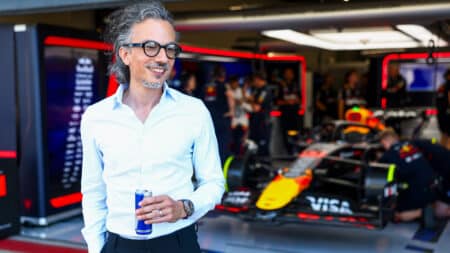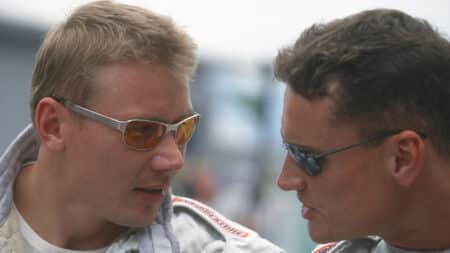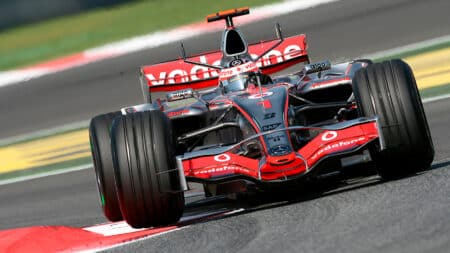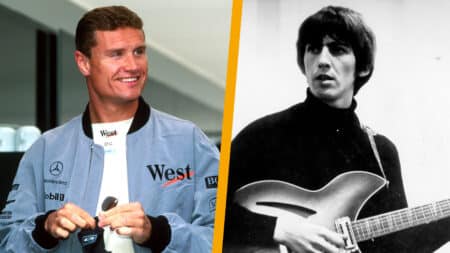
MPH: To the man trying to fill Christian Horner's shoes: good luck!
Laurent Mekies arrives as Red Bull F1 team principal with a series of immediate challenges to solve and long-term issues to tackle. He'll either sink or swim, says Mark Hughes
In the April 2014 issue of Motor Sport, we printed our 11-point ‘manifesto for change’. With the Grand Prix Drivers’ Association launching a fans’ survey over the Monaco Grand Prix weekend, we thought it was time to revisit Mark Hughes’s ideas for a better future for Formula 1.
Greed has damaged Formula 1, turned it from a vibrant, vivid, alive, unsettled and exciting environment, where anything might happen, into a predictable, codified template of commercial success, where everything is uniform and conforming to the consensus. But that era might be coming to an end; Bernie Ecclestone standing trial in a Munich court accused of bribery is possibly the beginning of the dismantling of the edifice that has applied the bland stick to the sport for the past few years. Here, we are going to consider how the punkish element that F1 once possessed – an environment of constant radical change, often rebellious and unbeholden to big business – could be reintroduced in a post-Bernie F1, but without being enslaved by the past.
Simply trying to recreate our favourite eras – whether that be the 1960s, ’70s or ’80s – would be contrived, retrograde and against everything that made those eras so appealing. But capturing that spirit within a thriving, constantly evolving modern entity is what we should be looking to do – and this is an outline of how that might be achieved in the future.
If we think back to the season often cited as the sport’s ‘electrification’, 1976, it had rebellion, human interest and big technical freedoms, even though the latter weren’t being fully exploited. Three years later they were, when Renault’s fascinating wrestle with turbo technology came good as Jean-Pierre Jabouille took victory at Dijon. Although that was one iconic moment, right behind him was another – as Gilles Villeneuve in his old-school, naturally aspirated Ferrari took on René Arnoux in the other Renault, rubbing wheels, locking up, driving off the track. Some thought they were insane. Whatever, what they gave us that day was insanely exciting.
F1 back then was cowboy territory with full rights yet to be established and no state of equilibrium. It was fascinating and its very volatility was a major part of its appeal. No one owned it really. It had grown organically, its circus moved from town to town across the globe. But there were very few rules and regulations, very little for the thrill to get snagged on. Then there was a fight for control, then came the money, the real money and the dirty games behind the scenes. Whenever something successfully makes big money, all those benefiting from it try to codify the success, the magic formula that keeps the dollars rolling in. Which loses its very essence and slowly strangles it. Everything from circuit design to money splits and on-track etiquette became bound up in rules – and the sport has become old, hidebound, inflexible. The money keeps the same people there, getting older and more conservative. Compared to that day at Dijon in ’79, F1 today is incredibly bland.
The new hybrid technical regulations for 2014 might force some unpredictability back into it – briefly, before the vast resources let loose on the problem makes everyone’s motors bulletproof once more. But it needs more than just that; there needs to be systematic change if F1 is to be poised for a world that is evolving faster than ever before. It needs to be an entity that embraces change, that benefits from unpredictability – and the ‘Black Swans’ of randomness. Every aspect of the sport – commercial, technical and human – needs to reflect this…

Laurent Mekies arrives as Red Bull F1 team principal with a series of immediate challenges to solve and long-term issues to tackle. He'll either sink or swim, says Mark Hughes

Former McLaren F1 team-mates Mika Häkkinen and David Coulthard are set to renew old rivalries in a new Evening with... tour – they told James Elson all about it

In Formula 1, driver contracts may look iron-clad on paper, but history shows that some of its biggest stars have made dramatic early exits

Former McLaren F1 ace told James Elson about his private audience with The Beatles' George Harrison, who played an unreleased grand prix-themed song